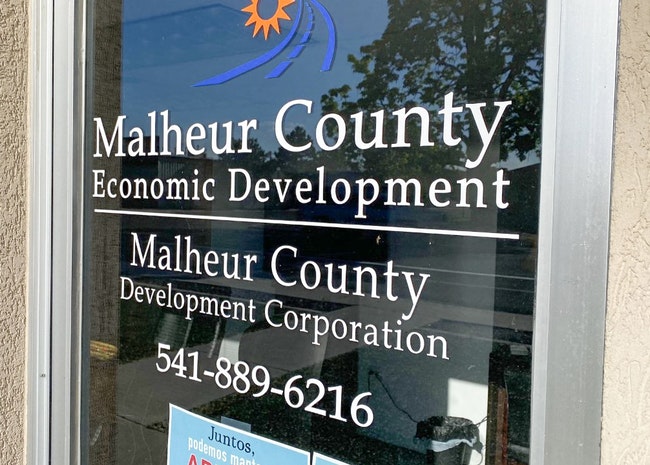
The Enterprise’s investigation into missing reimbursements to Malheur County started with an email in early April.
The newspaper asked Lorinda DuBois, the county’s administrative officer, whether the county was still receiving $4,000 a month to cover certain costs related to the planned rail shipping center in Nyssa that will serve the onion industry.
No, she said.
That puzzled us.
The county last year billed the Malheur County Development Corp. a total of $12,000 – some of the expense of contracting with Gregory Smith & Co. for project management services.
That one email exchange with DuBois triggered reporting that discovered Malheur County and its taxpayers have been shorted about $50,000 – and counting. The trail led to Greg Smith, a state legislator from Heppner and the director of the Malheur County Economic Development Department.
The Enterprise wanted to determine what happened. Why wasn’t the county getting repaid out of a $26 million fund of state money.
As is routine, the newspaper submitted requests for public documents. We have had to rely on such requests to get government information because Smith often won’t respond to questions or provide interviews.
The requests in April went to both the Malheur County Economic Development Department and the development company. Smith runs both entities.
On April 8, the newspaper sought “any document in any form relating to the $4,000 per month invoiced to ODOT on a reimbursement basis for the contract services of Gregory Smith and Company for the current fiscal year. This request is intended to establish whether such a reimbursement has been sought and if not, any document explaining why reimbursements claimed in the prior fiscal year are no longer being claimed.”
Smith responded about a week later with three invoices, two emails, and one calendar entry.
Nothing explained why the county wasn’t getting its money back.
We tried again, sending Smith another request on April 20.
The public records request sought “any record” “that would explain to the public why the monthly $4,000 charges are no longer being covered.”
Smith addressed the matter in a public meeting of the development board on April 27 and provided one more email and one more calendar entry.
Still, there was nothing explaining what happened to the money. We wanted to be clear that Smith was claiming there wasn’t another piece of paper relevant to that question.
On May 3, we said in a letter to Smith: “Please verify” that there was “no other public record whatsoever regarding the cessation of the monthly $4,000 claims.”
In the meantime, the Enterprise obtained from the state Transportation Department its records of reimbursement claims from Smith’s team.
On May 6, we advised Smith that “we have since obtained other documents establishing that your agency possessed but did not disclose responsive documents.”
About three hours later, Smith responded, this time providing a statement from his team’s account. This came a month after we started asking Smith for explanations and documents.
“Malheur County sent 3 invoices to MCDC in the amount of $4,000 each for administrative services. It was believed that administrative services provided by Malheur County were an allowable cost of the contract. ODOT did not turn down the monthly payments, however they advised that the reimbursements could be misinterpreted as an undue cost, therefore, the three invoices were negated. No other invoices were received.”
By then, we had assembled documents from the state, other county offices, and the banking and loan records for Smith’s project. The documents cast doubt on the accountant’s statement.
To seek information, we interviewed Stephanie Williams, the county’s in-house attorney. She mentioned a contract – one that Smith had never disclosed or even mentioned.
Williams provided the document.
The mystery only deepened.
That’s because Smith’s team in July 2020 formally agreed that the reload project would repay Malheur County up to $5,000 a month.
This was a formal document and Smith himself knew all about. That’s because the records showed that he was the one that pressed county commissioners to approve it.
County officials later relied on Smith’s assertion that even with the contract, the money couldn’t be paid because the state wouldn’t allow it. When we checked with state officials, they said that wasn’t so.
To wrap up our reporting, we followed our usual procedure and sent Smith a detailed list of questions – and copies of documents that we believed he had had all along but kept from us.
Here’s one example:
On April 15, 2021, you told the MCDC Board that no reimbursements were sought from ODOT for the Malheur County costs because “it became apparent it was more work than there was benefit.” Please elaborate on what work it would take to seek reimbursement.
* What was the basis for you to conclude it was too much work to seek up to $5,000 a month for Malheur County?
* How did you communicate that concern and decision to the contract CPA?
*How did you communicate that concern and decision to Malheur County officials?
*Did you take any steps to mitigate what you considered to be “too much work” so that Malheur County could recover up to $5,000 a month for its treasury?
Here is the full email to Greg Smith on Wednesday, May 12:
That same day, we sent questions to Lonny Hytrek, the accountant retained to handle invoices and other finance matters.
An example:
On July 9, 2020, your firm advised ODOT that it had been asked to remove the three Malheur County invoices from Request #3.
*Who made the request?
*What was the reason given?
*If your firm acted on its own authority to withdraw the invoices, why?
Here is the full email:
Because Hytrek works for the development company, we wanted to ensure he had permission from the company to provide the information.
On May 12, the following email went to Grant Kitamura, president of the company:
I copied you on two sets of questions as we trying to determine why Malheur County is missing out on thousands – roughly $50,000 and county – in reimbursements.
I am asking that as president of the Malheur County Development Corp., you authorize Lonny Hytrek and his team to provide full and forthright answers to questions posted to his firm.
I appreciate your consideration as we try to get to the facts and truth about this.
On Friday, May 14, Kitamura told us that he had sent that request to the attorney and he had not heard a response. He said he would not authorize the accountant to address the questions without the lawyer’s counsel.
While Kitamura was on the phone explaining his position, Smith was sending an email of his own.
Instead of answering the newspaper’s questions, the email was a statement from Kitamura’s board accusing the newspaper of “wrongful” reporting.
Contact Editor Les Zaitz by email: [email protected].
RELATED COVERAGE:
Smith finds recovering thousands for Malheur County ‘more work’ than it’s worth, blames ODOT
Development board slams Enterprise for ‘wrongful’ reporting
WATCHDOG: Nyssa rail project faces jeopardy as state stops funds, seeks overdue agreements
Malheur County board to farm operation: You will stay silent
Malheur County Court approves commitment letter for rail reload center
Nyssa rail center gets two thumbs up as construction start looms
Tracking the Treasure Valley Reload Center: Key data eludes county, stalls rail project
Malheur County needs $15 million for its industrial park. A two-year effort to get it flopped.




